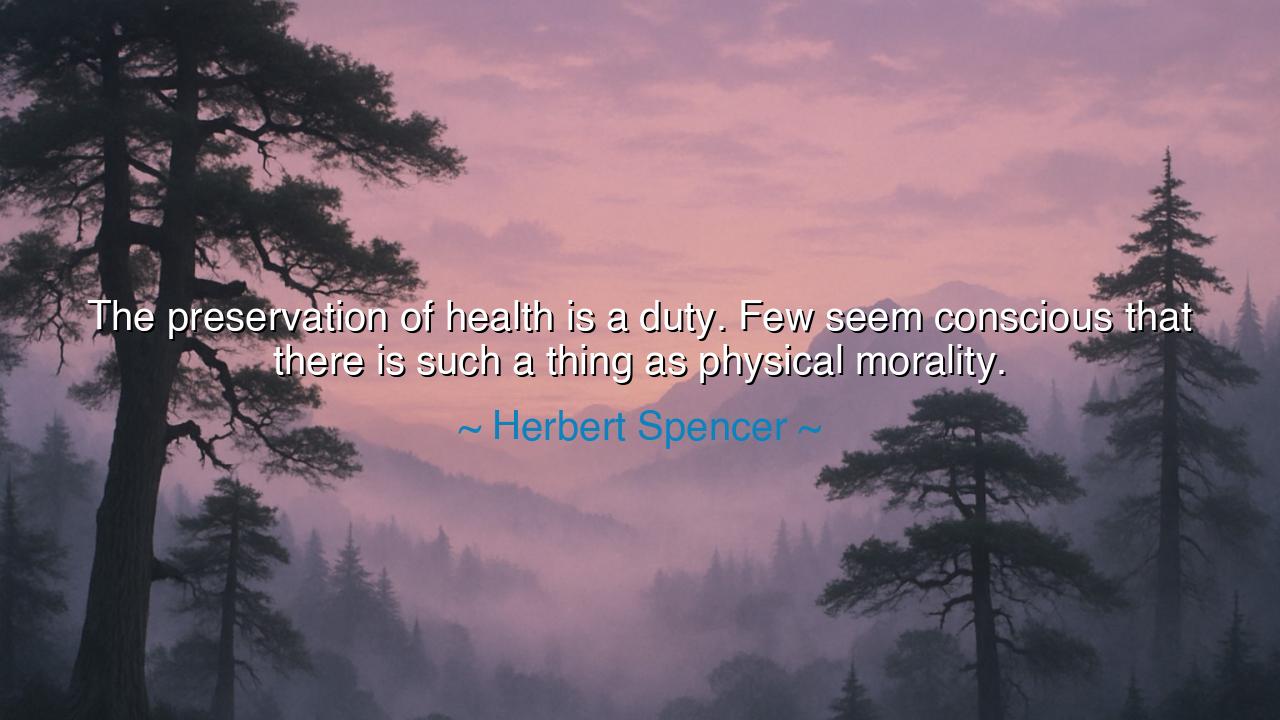
The preservation of health is a duty. Few seem conscious that
The preservation of health is a duty. Few seem conscious that there is such a thing as physical morality.






“The preservation of health is a duty. Few seem conscious that there is such a thing as physical morality.” — thus spoke Herbert Spencer, philosopher of the Victorian age, a man who looked upon the workings of nature and saw in them not only the survival of the fittest, but the moral responsibility of the strong. His words are not the idle musings of a scholar, but the stern call of a prophet who understood that health is not merely a personal possession, but a sacred trust — that the body, like the mind, demands virtue, discipline, and respect. In these few words, he binds together the worlds of ethics and biology, teaching that to neglect one’s physical well-being is not merely folly, but a quiet act of immorality.
When Spencer speaks of duty, he raises health to the level of the moral law — alongside honesty, justice, and compassion. For he saw that the body is not our servant, but our companion in the journey of life, and that to abuse it is to betray the very gift of existence. The ancient philosophers of both East and West knew this truth well. The Greeks called it sophrosyne — temperance, the harmony of mind and flesh. The sages of India spoke of ahimsa, the principle of nonviolence, not only toward others but toward oneself. Spencer’s “physical morality” is born of the same insight: that to live well, one must live responsibly, and that the laws of health are as sacred as the laws of the soul.
Yet few, he laments, seem conscious of this truth. Even in his time, as in ours, men chased ambition and pleasure while their bodies decayed beneath the weight of neglect. They worked without rest, ate without moderation, and medicated their pain instead of understanding it. They spoke of morality in lofty tones — of truth and virtue — yet sinned daily against their own flesh, forgetting that the mind cannot shine in a broken vessel. Spencer saw in this neglect a kind of hypocrisy: how can a man claim to serve society, to love truth, to pursue greatness, if he will not even care for the body that carries him through all these pursuits?
Consider the tale of Leonardo da Vinci, that titan of art and science, whose genius was matched only by his discipline. He believed that the care of the body was the foundation of creativity — that movement, rest, diet, and breath were sacred arts. In his journals, he wrote of walking long distances, observing the flow of air, the strength of limbs, the grace of animals. To him, health was harmony, the music of all organs in concert, enabling the mind to rise to its highest clarity. Leonardo lived what Spencer preached: that the physical and moral life are one — that the preservation of health is the preservation of wisdom, compassion, and purpose.
Spencer’s warning carries even greater weight in our own age, where convenience has become a new kind of slavery. We sit when we should move, consume when we should abstain, and sleep less though the world demands more. We treat exhaustion as a badge of honor, gluttony as joy, and indulgence as freedom — yet these are the chains of modern man. Spencer’s idea of physical morality calls us to break these chains, not for vanity, but for virtue. To be healthy is not to pursue beauty or power, but to honor the body as a temple of the spirit, and to prepare it for service to others.
The ancients would have understood this perfectly. In the schools of Athens, physical training was inseparable from philosophy. The student who debated logic also learned to wrestle, to run, to breathe deeply. For the Greeks knew that a disordered body breeds a disordered soul. Likewise, in the monasteries of Asia, monks practiced meditation, breathwork, and movement not as exercise, but as prayer — a discipline that bound body and spirit together in obedience to divine order. Herbert Spencer’s “physical morality” is the modern echo of this timeless principle — that health is not indulgence, but reverence; not vanity, but gratitude.
The lesson, then, is as clear as the morning light: your body is not yours to waste. It is the instrument through which your purpose sings, the vessel through which your compassion acts, the foundation upon which your mind stands. To preserve your health is to preserve your capacity to love, to create, and to serve. Therefore, eat not in greed but in mindfulness; rest not in sloth but in renewal; move not in haste but in harmony. Let discipline be your offering, and wellness your devotion.
So, my children of this modern world, remember the wisdom of Herbert Spencer. To care for your health is not to pamper the body, but to honor life itself. Every breath you take with awareness, every meal chosen with balance, every moment of rest taken in gratitude — these are acts of moral strength. For the one who preserves his body in virtue preserves also his mind, his heart, and his spirit. And in such harmony, the human being becomes what he was meant to be — a living reflection of the divine order, radiant in both body and soul.






AAdministratorAdministrator
Welcome, honored guests. Please leave a comment, we will respond soon